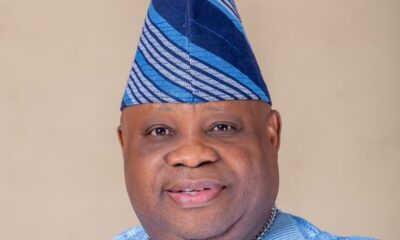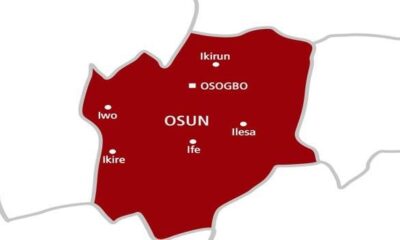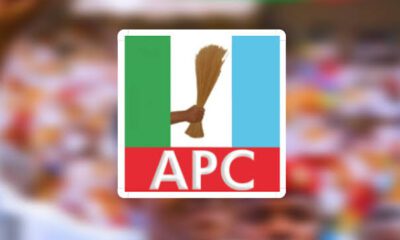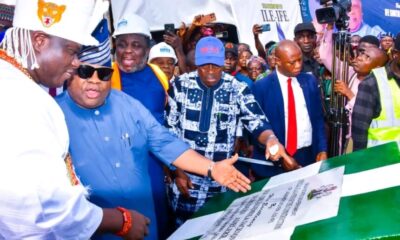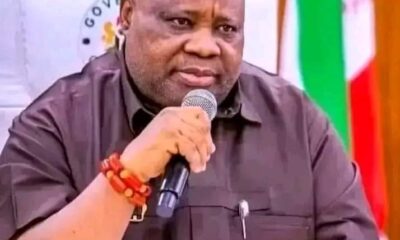Opinion
Adeleke’s victory, not blood-stained
By Goke Awoyemi
When the people of Osun State, South-West Nigeria, trooped out enthusiastically to elect who governs them for the next four years on 16th July, 2022, they had two candidates in mind. These are Governor Isiaka Adegboyega Oyetola and Senator Nurudeen Ademola Adeleke, as the other contestants as INEC results has shown were mere appendages. Immediately Senator Ademola Adeleke was announced as the winner, President Muhammadu Buhari from the rulling All Progressive Congress congratulated him. The mere fact that no single life was reportedly lost during the exercise has further strengthened the credibility of the poll that Adeleke’s Victory was not blood-stained.
Except for Ismail Omipidan, the Chief press secretary to Governor Adegboyega Isiaka Oyetola’s article, published in the Nigerian Tribune, one would have reserved his comment on the Osun matter since it has been subjected to judicial process for determination. Omipidan’s article is seen as an attempt to use the paraphernalia of office to whip up sentiment, so that the reading public could sympathise with his principal and influence the decision of the tribunal.
However, the civil society organization, YIAGA AFRICA which Omipidan wanted to use to whip up sentiment has described “as lies efforts to twist its report on the outcome of the governorship election in Ekiti and Osun States.” The organization in a report published by Saturday Punch on September 17, 2022 stated this while reacting to publication credited to Ismail Omipidan claiming that the recently launched YIAGA AFRICA election result analysis dashboard report for the two elections in Osun and Ekiti confirmed that the governors who contested on the platform of All progressive congress won the elections. YIAGA AFRICA, in the statement issued by its Executive Director, Samson Idodo, said “Omipidan was only twisting the fact.”
Omipidan should think of going back to The Sun newspaper, a reputable platform where he was an Assistant Editor before his engagement. He should take a cue from elderly people like us, who has not been on any newspaper payroll since 2015, when INSIDER magazine where I was the South-West Bureau Chief went bankrupt. It was in the course of this adventure that I encountered Femi Babafemi, former Saturday Sun Editor who now works as the Public Affairs Director, Nigeria Drug Law and Enforcement Agency (NDLEA), who gave me a brief on specific target among the Yorubas who has national and state voices for interview that could adorn the front page of the newspaper. Senator Iyiola Omisore, who has not officially joined the rank of All Progresive Congress from the Social Democratic Party, but enthroned governor Oyetola in 2018 in a run-off election was among top Yoruba leaders I was commissioned to interview. But on sighting me when I entered the inner-most part of his living room, inspite of the fact that I told his closest political confidant, shouted at me with anger and said “Kilodegan? Moni mi o fe press interview” meaning which, What is the problem? I said I don’t want any press interview. I did not shake, but was motionless for about 3 minutes, perhaps because his late father Oba Olajide Omisore (may his soul rest in peace), who was gesticulating at me was there with him. He (the late Oba), must have remembered when my late father (who told me that himself and the late Oba were contemporaries in the civil service before they retired) and myself met with the Oba at his Orilonise residence, Moore area, Ile-Ife. I from there placed a call to Femi Babafemi to talk to Omisore himself, But he advised me to leave him if he doesn’t want to talk. Since then, I always have mix feelings before going to Senator Omisore’s house without invitation. These are some of the ugly encounters in this thankless job even if you meant no harm. Omipidan should not be afraid of going back to his desk instead of engaging the public in trivialities.
The journalistic instinct in me invoked my monitoring the poll in 3 polling boots namely, Gidiogbo, Ogbo-Oya (the ancestral home of Senator IyiolaOmisore, the National Secretary, APC) and Lujumo all situated at both Ife East and Central Local government arears. In all the 3 polling units, the polls were peaceful, free and devoid of any form of intimidation, except at Gidiogbo where a young man came shouting forcefully at the people on the queue that they must vote for a particular party in the presence of security agents. But because he was alone devoid of gangsters, he quickly left and his impact was not felt by the people waiting to cast their votes.
Governor Isiaka Adegboyega Oyetola lost the Osun governorship poll because of the lack-lustre performance of the President Buhari led Federal government on security, economy (where the dollar keeps rising every day and the price of commodities keeps soaring, with a loaf of family bread inches to N1,000, pushing higher the number of suicide especially among youths to commit suicide), infrastructural decay, (a road of one major street in Ile-Ife which the government started four years ago has not gotten half way till date), and the whole gamut of human endeavour, which prompted media guru Bashorun Dele Momodu to reason that APC is leading Nigeria to Golgotha, and except Nigerians want to get crucified, APC should not be the choice.
Sentor Ademola Adeleke won with heavy reliance on his late brother’s solid political structure, late Isiaka Adetunji Adeleke who was the third Republic governor, and the first democratically elected governor in Osun and a serving Senator until he died in April 23rd, 2017. One would have expected governor Adegboyega Oyetola to congratulate him for defeating him twice, first before the run-off in 2018 and second on July 16th, 2022. In the America Presidential system which we copy from, when they try the Republicans for one or two terms, they switch over to the Democrats.
Goke Awoyemi, media consultant, sent this piece from Ile-Ife, Osun State
08039506843 (SMS please)
Opinion
Tinubu, the opposition and the Nigerian honey pot


By Professor Kayode Soremekun
As the Tinubu administration approaches the one year mark, it is important to effect a review of what has transpired in the last twelve months.
At the level of sheer policy postures and pronouncements, much has been done and so much is also being done, such that it is almost impossible to keep pace .
In this narrative however, I have decided to dwell on an unusual aspect of the last twelve months.
On this note, the thrust of my argument is this:Nigeria is a lucrative honeypot for external actors and their local collaborators. It is a situation in which every achievement of this administration translates into a loss for external actors and their interests. These indeed are the various indices of the opposition which will continue to stalk this administration.
At the instinctual level, and unfortunately, the average reader is likely to view the opposition in terms of predictable variables like the: PDP, LP and possibly the various indices of civil society.
But this piece is not preoccupied with these.
Rather our attention is focused on the implications of the evolving dynamics of Air Peace (AP)and the competition in the aviation industry.
It is instructive to recall here that, as soon as AP ticked off on the Lagos-London route, the other airlines came into some form of self-serving epiphany. They changed tack through the process of fare reductions.
The implications of this on-going process are deeper than one may think. As long as Nigeria was absent on the Lagos-London route, the route was something of a honey pot for the other airlines. It was a sybaritic situation in which all the other airlines were busy enjoying themselves at the expense of Nigerians and Nigeria.
In my innocence I thought that the only airline that was benefitting from this bazaar of the Lagos- London route was British Airways (BA) whose ancestors were the original predators of what passes for the Nigerian state. Little did I know that other Airlines like Air Maroc and Egyptair were also partakers of this largesse.
On this note, the mind remembers the goggled General, Sani Abacha. In the light of the inclement interplay between his regime and Britain, British Airways was banned from Nigeria. But as soon as he died, BA resumed its lucrative foray into Nigeria. One can imagine how much BA must have lost in the light of that move by the General.
The implication is that for every omission or commission on the part of Nigeria, someone out there is smiling home with huge profits. Such forces and individuals constitute at one level the opposition that anyone who occupies Aso Rock, has to contend with. Needless to say, our Nigeria is a huge honeypot since we are talking here of a huge market of 200 million Nigerians.
The situation also partly explains why the Naira will continue to go south since for most of our basic needs, we depend heavily on the external realm. It also explains why anybody who occupies Aso Rock is not just up against the usual opposition at the domestic level, he is also up against the various indices of opposition beyond Nigeria.
And here we are talking about hard-headed interests and zero-sum games in which what one entity loses, is gained by another one.
This brings to mind another major area in which over time, Nigeria continues to be a spectator in the scheme of things.
Our specific reference here is the Nigerian oil industry. Nigeria continues to be passive in this industry. So passive that as an oil producing country there are no backward linkages like refineries and petrochemicals. Even as I write, there are rumblings to the effect that there are jitters out there. This is because, should Nigeria succeed in bringing on stream her own refineries, very many jobs will be lost by refiners in places like Rotterdam and South Korea. These are some of the entities who export refined oil to an oil producing Nigeria. Again as regards petrochemicals, should Nigeria come into her own in this vital area, then our imports of raw materials will reduce drastically. In the light of what is happening to Air Peace, we should expect a fight-back from relevant interests out there.
Very much the same thing can be said for our steel industry.Till date, it remains comatose. No thanks to international conspiracy ably aided by a wayward ruling class.This is invariably a sad feature which stretches far back to the dawn of our political independence. Again, Nigeria’s attempts to come into her own in this vital area will be resisted, and vigorously too, by the relevant external forces out there in collaboration with their internal allies. So as PBAT Tinubu settles into his second year in office, he will do well to remember and appreciate that he will be contending with various indices of the opposition at the external various ways these have their tongues and fingers in the Nigerian honey-pot.They will not give up easily.Which is why, the Tinubu presidency should give these self-serving domestic and external forces a good run for their greed and avarice.
There is some hope however. This cautious optimism lies in the fact that, in the course of that historic outing in Abeokuta where Tinubu openly staked his claim to the Presidency he also pronounced with equal gravity on his place in history. Specifically he opined that he would not want to be a footnote to the Nigerian narrative. So all said and done, it is possible to contend here that in the light of what can be regarded as his self-conscious place in history; PBAT has his work cut out for him in critical and vital areas of our national life like: the steel industry, our oil industry and of course the Aviation sector.
Success in these various areas can only mean that the Great Black Hope is ready to come into her own.
Soremekun, a professor of political science was the second vice chancellor of Federal University Oye Ekiti, Ekiti State.
Opinion
Organisation of the Petroleum Exporting Countries’ (OPEC) pride in its African roots
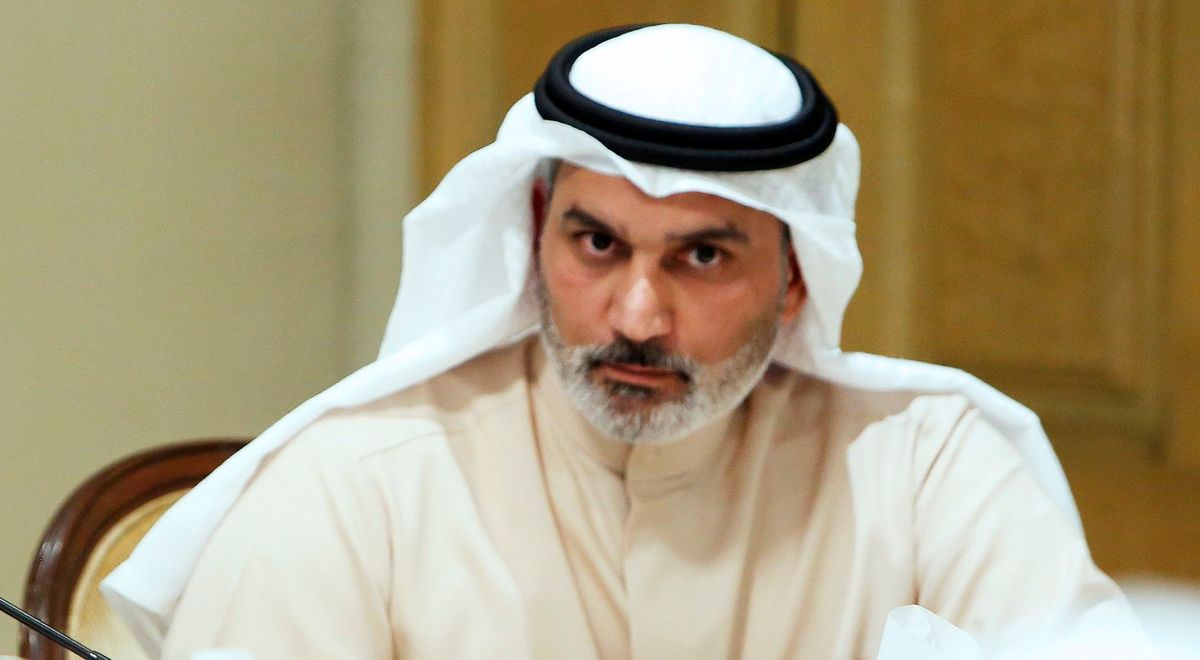

By Haitham Al-Ghais, OPEC Secretary General
Since assuming the office of OPEC Secretary General almost two years ago, I have had the privilege of visiting every African OPEC Member Country, as well as several other African countries. Every visit has reaffirmed my firm conviction that the future is bright for Africa and that the oil industry can play a constructive role in that future. Our Organisation stands ready to offer any support it can to help this great continent realise its awesome potential.
OPEC takes great pride in its strong and enduring African connections, heritage and identity. Half of our Member Countries are African and this includes the continent’s most populous country, Nigeria, and the geographically largest by area, Algeria. We are also privileged to count Congo, Equatorial Guinea, Gabon and Libya as Member Countries. Additionally, two African countries are part of the historic ‘Declaration of Cooperation,’ between OPEC and non-OPEC producing countries, namely Sudan and South Sudan.
Our Organisation’s past is imbued with African character. Looking throughout our 63-year history, many significant meetings took place in African cities. From the Ninth Meeting of the OPEC Conference in Tripoli in 1965, critical meetings and conferences have been held in Algiers (including our first ever Summit), Oran, Lagos, Abuja, Luanda, and Libreville.
Indeed, the idea for our Organisation was conceived in Africa, specifically Egypt. It was at the Cairo Yacht Club in 1959, that the Gentleman’s Agreement was forged that paved the way for the establishment of OPEC in Baghdad in September 1960.
Having played a pivotal role in shaping our past, we have no doubt Africa will be instrumental in the Organization’s future and the future of the oil industry. This is a dominant theme in OPEC’s World Oil Outlook 2045 (WOO).
Africa has a young and vibrant population. By 2045, the Middle East and Africa are forecast to be the leading regions by overall population, adding 723 million people in the period 2022-2045.
We anticipate a bright future for Africa’s oil industry with substantial opportunities for growth. The continent is home to five of the top 30 oil-producing countries and its proven oil reserves amounted to around 120 billion barrels at the end of 2022. This will be crucial to meet the growing global demand for oil, which is expected to rise to 116 million barrels per day (mb/d) by 2045.
These resources will be crucial in enabling African countries to deliver for their peoples. For many oil-producing developing nations, oil production is a way to generate revenue streams that help address pressing and legitimate needs, such as development, employment, education, reducing poverty and investing in public services.
One of the great challenges facing governments here and, indeed, in many other parts of the world is energy poverty. There are 675 million people worldwide who lack access to electricity, four out of five of whom live in sub-Saharan Africa. Furthermore, 2.3 billion people are without clean fuels and technologies for cooking, which can lead to a host of related health and environmental problems.
Of course, OPEC supports efforts that lead to a reduction in greenhouse gas emissions, but we look for this to be achieved in a manner that strikes a fine balance between energy security and sustainable development; ensuring that nobody is left behind. We are also strong advocates for the principle of common but differentiated responsibilities and respective capabilities.
The continent of Africa is home to 17 percent of the world’s population, but is responsible for under 4 percent of global CO2 emissions, with many African countries contributing virtually nothing to global emissions.
When we consider historic cumulative CO2 emissions, the G7 has contributed over 43% of the total alone since 1850, while OPEC Member Countries account for only 4 percent.
These statistics reflect the fact that there is no ‘one size fits all’ solution to addressing climate change and national circumstances need to be taken into account. We need an all-peoples, all technologies and all-energies approach. Technological innovation is a key focus for our Organisation.
It is why our Member Countries are investing heavily in hydrogen projects, Carbon Capture and Utilisation and Direct Air Capture facilities, and the circular carbon economy.
Looking at recent developments across the energy scene in Africa, we see opportunities for the oil industry in places like Namibia, Senegal, Mozambique and Mauritania, to name but a few. OPEC is attentive to these developments and stands ready to support all countries on the African continent in the next chapter in developing their industries. In this regard, we look forward to enhanced cooperation with the African Energy Chamber in the years and decades to come.
The African Energy Chamber, as the voice of the African energy sector, commends OPEC’s commitment to the growth of the African oil and gas industry.
Opinion
President Tinubu: A year of healing and unifying Nigeria


By Fredrick Nwabufo
The intangibles of leadership are as potent and profound as the corporeal manifestations of governance. A people must not only see the brick-and-mortar elements of leadership; they must also feel and sense leadership in its quantum of compassion, healing, solace, and capacity to inspire unity, as well as foster peace and progress.
In fact, the incorporeal constituents of leadership are so important that citizens may not see utility in improved economic well-being and massive industrial transformation, if the leadership does not manage the delicate confluences of social and psychological needs.
In some of my treatises as a columnist years ago, I had written that beyond other rudimentary ingredients and supplements of leadership, Nigeria needs a leader who is a healer-in-chief and a unifier by example. A leader who has the proclivity and deliberateness to bring the nation together.
I am most delighted and proud to say Nigeria has found its healer-in-chief; its unifier by example, and consoler-in-chief in President Bola Tinubu. He is the President for all Nigerians.
It has been President Tinubu’s one year of healing and unifying Nigeria. In his inaugural speech on May 29, 2023, the President made a declaration that has become a defining motif of his administration.
He said: “Our administration shall govern on your behalf but never rule over you. We shall consult and dialogue but never dictate. We shall reach out to all but never put down a single person for holding views contrary to our own. We are here to further mend and heal this nation, not tear, and injure it.”
And true to his promise, President Tinubu has been listening and reaching out to Nigerians of diverse complexions and artificial partitions, as well as mending and healing the nation.
Healing and unifying the nation, how, you might ask? By personal example; in words and in deeds. There is no greater purpose and value to leadership than personal example. The place of leadership in forging bonds of communality is the place of purpose and deliberateness. Leadership must be deliberate in managing diversity and in fostering kinship among variegated people. Nation building cannot be left to chance or to a whim. There must be purposive plans and actions towards uniting the people. And these plans and actions, President Tinubu has been successful at carrying through in the past one year.
The President has maintained an accustomed patriotic, graceful, and expansive mien. In his public statements, mostly done extempore, he has always faithfully affirmed his commitment to Nigeria’s unity.
In one of his many noble articulations, he said, “I am irrevocably committed to the unity of Nigeria and constitutional democracy. Constitutional democracy has been reflected greatly here since we assumed office.”
Also to consider are the broad and far-reaching projects and programmes which are in themselves totems of unity – with all Nigerians, irrespective of class or creed, as beneficiaries and potential beneficiaries.
The approval of the Renewed Hope Infrastructure Development Fund to facilitate effective infrastructure development across the pivotal areas of agriculture, transportation, ports, aviation, energy, healthcare, and education, with salient projects across the country is a further affirmation of statesmanship and leadership.
The ongoing epochal Lagos-Calabar Coastal Road, with its attendant immense economic and social benefits to many states within and outside that corridor; the Sokoto-Badagry Road project, and the completed Port Harcourt to Aba stretch of the Port Harcourt to Maiduguri narrow-gauge rail, among other key developments across the nation, assert the all-encompassing and genuine intentionality to nation building. No Nigerian is left behind.
Within the first year, the President also approved the upgrade of key health infrastructure and equipment across all six geo-political zones in line with his administration’s vision of overhauling the health and social welfare sector for enhanced service delivery to all Nigerians.
The following teaching hospitals across the geo-political zones were marked for the establishment of oncology and nuclear medicine centres as part of the President’s bid to ensure that top-tier cancer diagnosis and care is accessible across the country: (1) University of Benin Teaching Hospital, (2) Ahmadu Bello University Teaching Hospital, (3) University of Nigeria (Nsukka) Teaching Hospital, (4) Federal Teaching Hospital, Katsina, (5) University of Jos Teaching Hospital, and (6) Lagos University Teaching Hospital.
Ten other hospitals across all the geo-political zones were also pencilled for critical healthcare-service expansion projects across the fields of radiology, clinical pathology, medical and radiation oncology, and cardiac catheterisation.
The take-off of the first phase of the Consumer Credit Scheme, which is essentially a mitochondrion enabling citizens to improve their quality of life by accessing goods and services upfront, paying responsibly over time, and by the same token bolstering local industry and stimulating job creation is another social cohesion sealant – with all classes of working Nigerians as beneficiaries. In summary, the establishment of the Nigerian Education Loan Fund (NELFUND) with the pre-eminent vision of safeguarding Nigeria’s future by ensuring that all Nigerian students and youths, regardless of their social, ethnic, or religious backgrounds, have access to sustainable higher education and functional skills, further accents the President’s fidelity to building a stable, strong, united, peaceful, and progressive nation.
One thing is certain: Citizens agree that they have a President for all Nigerians.
-
Finance4 months ago
Court orders Sen. Victor Umeh to repay N136m bank debt to AMCON
-



 Abuja Update3 months ago
Abuja Update3 months agoUNDP, FG partnership needed to achieve inclusion, equity- Minister
-
capital market2 years ago
Rt.briscoe, FBNH, Others halts negative performance of stock market
-
Abuja Update2 months ago
Banks drive stock market performance with N147bn gain
-



 Health1 month ago
Health1 month agoCapacity training will reduce migration of health workers- NPHCDA
-



 Business3 weeks ago
Business3 weeks agoTingo Group unveils Tingo Electric, Tingo Cola drink at Lagos launch
-
Submission Guidelines4 months ago
CALL FOR SUBMISSIONS: POETRY COLUMN-NND
-
News4 months ago
Oil thieves sponsoring malicious media campaign against Navy – Spokesman



